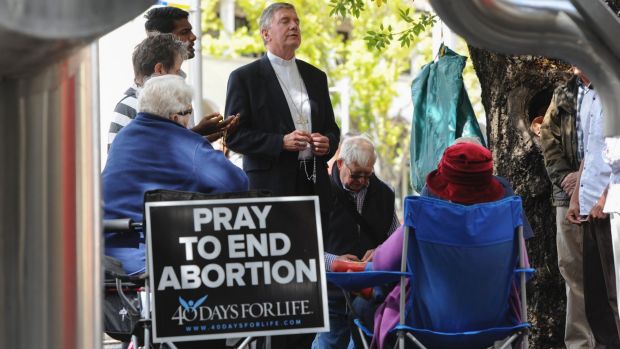
Archbishop of Canberra and Goulburn, Christopher Prowse, centre, attends an anti-abortion prayer vigil outside the ACT Health building in Moore Street, Civic. Photo: Graham Tidy
When I was a girl I was deeply concerned about women’s reproductive health rights. Of course that’s not what we named it back then, but even as children we heard stories of desperate women trying to terminate unwanted pregnancies.
These stories involved “Little Green Pills”, hot baths, brandy, knitting needles, coat hangers, ghastly infections and shame, shame, shame. That such uniquely female health issues were so shrouded in shame was a reflection of the oppression of women at that time.
They were a common source of anti-women humour perpetuated by some men and boys. Such humour was a good way of keeping women in their place; at home pregnant, in the kitchen. I never imagined that 60 years later, at the age of 65, I would still be witnessing the use of shame to keep women down. It’s an issue that has outlived my ovaries.
These days the “shamers” include the Catholic Church and so-called protesters who gather outside fertility clinics to harass women seeking abortions. At one regional clinic, protesters have taken photographs of women seeking assistance from the women’s health service. This is clearly a significant breach of health privacy rights in a small town where everyone knows everyone else’s business.
In 2008, Victoria passed the Abortion Law Reform Act, making it legally clear that abortion is a health right. Section 8 of that legislation is a conscience clause so that if a doctor has a conscientious objection to abortion she or he must reveal that to the patient and refer her to another practitioner who does not have such an objection.
Some doctors have tried to mislead others into believing section 8 forces doctors who have conscientious objection to abortion to refer the patient for an abortion. This is clearly wrong. Once a woman has been referred to another doctor a number of things may occur. The woman could be referred for an abortion, she could be advised of all her options and assisted to make a decision that suits her needs. Any doctor who opposes this approach seems to be arguing that a pregnant woman should only be entitled to hear one opinion – their own. This is all part of the continuing belief of some people that they have the right to shame pregnant women.
Even though abortion is now a legal health right of women in Victoria, access to services remains a big problem. This is particularly so in the regions and for women seeking later-term abortions. When women finally find their way to a service, they should be able to access it free from shaming. Staff from the clinics also experience harassment from these people.
Tasmania has now also passed abortion-law reform legislation that includes a “bubble zone” clause. This prevents the shamers from protesting outside clinics. Tasmania is currently the only state to have such a law, which is part of its Reproductive Health (Access to Terminations) Act 2013. This allows for an access zone of 150 metres from premises at which abortions are provided. Prohibited behaviours include besetting, harassing, intimidating, interfering with, threatening, hindering, obstructing or impeding a person. Such behaviours must not be engaged in in ways that can be witnessed by a person accessing the clinic.
Victoria also needs a bubble zone clause similar to Tasmania’s. The Australian Democrats tried to do so in 2013 but their attempts were not successful. It’s time for this to be raised again so that women seeking legitimate health services are no longer forced to undergo a barrage of shaming and harassment.
Beth Wilson is a former health services commissioner of Victoria.
